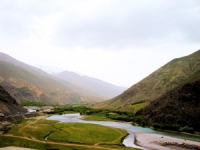Water sharing between Central Asian countries has been conflicting for quite a long time already.
About the Network

The Amu Darya Basin Network comprises local and international experts, practitioners, scientists, young professionals, researchers, policymakers, donors and implementing organizations working in or interested in development of the Amu Darya Basin. Adopting a basin-wide vision, the Amu Darya Basin Network acts as a platform for interaction and communication among respective members with the objective to generate and spread knowledge and policy tools, exchange of experiences and perspectives about important water governance issues in the Amu Darya Basin. The Amu Darya Basin Network highlights the need for local ownership and input in the management of shared waters, and for engagement in the region in more concrete ways. for researchers and practitioners in the Amu Darya Basin.
History
In 2010 the EastWest Institute and the Irrigation and Water Engineering Group of the Wageningen University have jointly launched a project entitled ‘Afghan-Central Asian water cooperation on management of the Amu Darya: connecting experts and policymakers in the low lands’. This one year process was carried out within the framework of the Development Policy Review Network and focused on cross-border cooperation between Afghanistan, Kyrgyzstan, Tajikistan, Turkmenistan and Uzbekistan on the management of the Amu Darya basin’s shared water resources. The Amu Darya Basin Network was created in the framework of the above mentioned project. The network currently has around thirty five members and includes policymakers, scientists, researchers, practitioners, and experts from Afghanistan, Tajikistan, Uzbekistan, Azerbaijan, Belarus, Belgium, France, Germany, Hungary, the Netherlands, United Kingdom, and the United States of America.
Vision
Progressing regional cooperation over shared resources in the Amu Darya river basin, in which we envision that (1) Afghanistan is part of the Amu Darya river basin in legal, institutional, technical and scientific terms; (2) there is a technical and scientific collaboration in agriculture, energy, and water sectors between the riparian countries; (3) the Universities and research institutes in the Amu Darya basin have interstate regional mobility programs where future specialists acquire specialized and interdisciplinary knowledge and skills;
Mission and goals
To contribute to the above-mentioned vision, the Amu Darya Basin Network aims to provide a space to interact in a productive platform among international and local policymakers, scientists, researchers, practitioners, and experts, in order to:
- Facilitate connection, exchange experiences and perspectives, generate lessons learned and best practices,
- Generate knowledge and constructive policy tools through the development of common and sustainable approaches to crucial issues of water security in the region, where national interests are transcended and aligned with a Basin wide approach.
- Generate information tools to contribute to coordination of ongoing research activities, as well as regional, national and donor policies.









